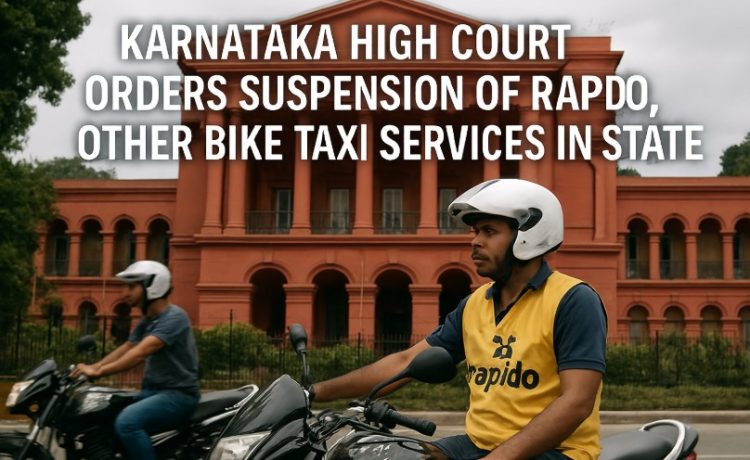Karnataka High Court Halts Bike Taxi Operations, Gives State 3 Months to Frame Regulations
Bengaluru, 3 April, 2025 – In a landmark ruling, the Karnataka High Court has ordered an immediate suspension of bike taxi services, including Rapido, Uber, and Ola, directing the state government to formulate clear regulations within three months. The decision comes as a significant development in the ongoing debate over the legality and safety of bike taxis in Karnataka.
Court Directs Immediate Cessation of Services
Justice B.M. Shyam Prasad pronounced that bike taxi aggregators must cease operations within six weeks, emphasizing that no two-wheelers can be registered as transport vehicles until proper guidelines are established under the Motor Vehicles Act, 1988.
“The transport department cannot be directed to register motorcycles as transport vehicles or issue permits for such services until appropriate government regulations are in place,” Justice Prasad stated.
Government to Draft New Guidelines
Karnataka’s Transport Minister, Ramalinga Reddy, assured compliance with the court’s directive. “We will review the certified copy in detail and work on framing appropriate guidelines within the given timeframe,” he told The Indian Express.
Rapido Voices Concern for Riders
Expressing disappointment, a Rapido spokesperson highlighted the impact on livelihoods. “Karnataka-born Rapido is concerned about the welfare of lakhs of bike-taxi captains onboarded on the platform. We will evaluate legal remedies once the detailed order is available,” the spokesperson said.
Safety and Regulatory Challenges
The court referenced a 2019 expert committee report flagging traffic and safety concerns. The state has long contested bike taxis, arguing that private (white-plated) two-wheelers cannot be used commercially. Past crackdowns saw over 300 bikes seized between 2019 and 2022 following protests from auto unions.
A Shift Towards Electric Mobility
In 2021, Karnataka introduced the Electric Bike Taxi Scheme to promote sustainable transport but withdrew it in March 2024, citing misuse and safety issues. Rapido, however, continued operations under interim court protection.
What’s Next?
With the court’s latest ruling, bike taxi aggregators must halt services in six weeks, while the state drafts new regulations. The decision could reshape urban mobility in Karnataka, balancing innovation with passenger safety.
Urban Mobility Expert Weighs In
Satya Arikutharam, an urban transport analyst, supported the move. “Bike taxis pose safety risks. The government should regulate autos and shared mobility instead. Aggregators must respect policy frameworks rather than prolong legal battles.”
As Karnataka prepares for structured bike taxi norms, the ruling sets a precedent for other states grappling with similar regulatory challenges.
What Rapido Bike Taxi Stakeholders say?
- Rapido Captain:
“This ruling jeopardizes livelihoods of lakhs of riders. We urge swift regulatory clarity to protect gig workers.” - Bengaluru Bike Taxi Captain:
“With no other jobs available, this ban will starve our families. Why kill our only income source?” - Rider Welfare Association:
“Overnight bans crush hardworking riders. The government must provide alternatives, not just restrictions.” - Mysuru Part-Time Rider:
“After pandemic job losses, Rapido was my lifeline. Now what will we do?” - Mobility Expert:
“Regulation is needed, but abrupt bans hurt vulnerable workers most. Policy should balance safety and livelihoods.”
#BikeTaxiSuspension #LivelihoodAtRisk #GigWorkersStruggle #RapidoRiders #UnemploymentCrisis
![]()











